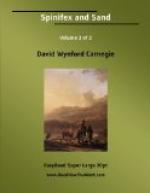In due time I reached Coolgardie, where Lord Douglas and our new partner, Mr. Driffield (since drowned in a boating accident on the Swan River), joined me. They had engaged the services of one Luck and his camels, and had ridden up from the Cross. The rush to Kurnalpi had just broken out, so Driffield, Luck, and I joined the crowd of fortune-hunters; and a queer-looking crowd they were too, for every third or fourth swagman carried on his shoulder a small portable condenser, the boiler hanging behind him and the cooler in front; every party, whether with horses, carts, or camels, carried condensers of one shape or another; for the month was January, no surface water existed on the track, and only salt water could be obtained, by digging in the salt lakes which the road passed. The nearest water to the scene of the rush was a salt lake seven miles distant, and this at night presented a strange appearance. Condensers of every size and capacity fringed the two shores of a narrow channel; under each was a fire, and round each all night long could be seen figures, stoking the burning wood or drawing water, and in the distance the sound of the axe could be heard, for at whatever time a party arrived they had forthwith to set about “cooking water.” The clattering and hammering the incessant talking, and the figures flitting about in the glare, reminded one of a crowded open-air market with flaring lamps and frequent coffee stalls. Kurnalpi was known at first as “Billy-Billy,” or as “The Tinker’s Rush”—the first name was supposed by some to be of native origin, by others to indicate the amount of tin used in the condensing plants—“Billy,” translated for those to whom the bush is unfamiliar, meaning a tin pot for boiling tea in, and other such uses.
Certainly there was plenty of tin at Kurnalpi, and plenty of alluvial gold as well for the lucky ones—amongst which we were not numbered. Poor Driffield was much disgusted; he had looked upon gold-finding as the simplest thing in the world—and so it is if you happen to look in the right place! and when you do so it’s a hundred to one that you think your own cleverness and knowledge guided you to it! Chance? Oh dear, no! From that time forth your reputation is made as “a shrewd fellow who knows a thing or two”; and if your find was made in a mine, you are an “expert” at once, and can command a price for your report on other mines commensurate with the richness of your own!
As the gold would not come to us, and my partner disliked the labour of seeking it, we returned to Coolgardie, and set about looking after the mines we already had. Financial schemes or business never had any charms for me; when therefore I heard that the Company had cabled out that a prospecting party should be despatched at once, I eagerly availed myself of the chance of work so much to my taste. As speed was an object, and neither camels nor men procurable owing to the rush, we did not waste any time in trying to form a large expedition, such as the soul of the London director loveth, but contented ourselves with the camels already to hand.




